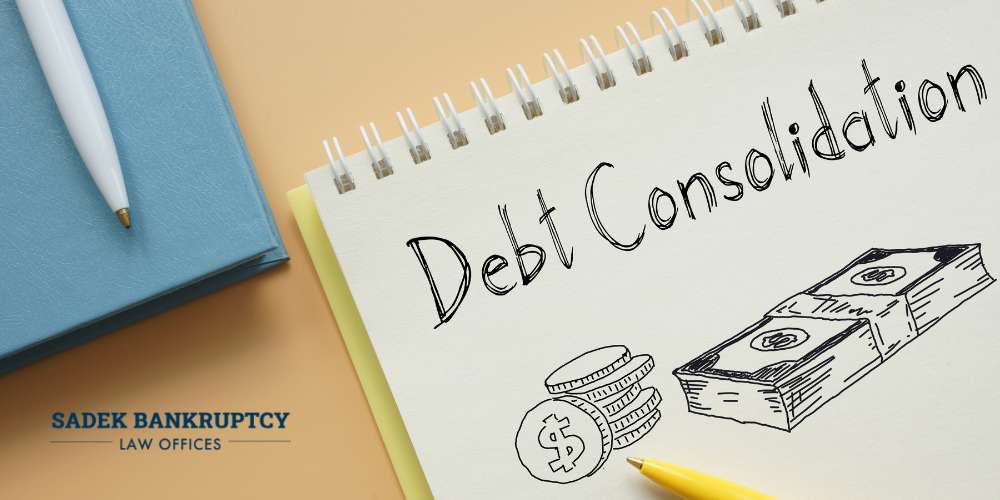Table of Contents
Debt consolidation can impact your ability to buy a home by affecting your credit score and debt-to-income ratio.
Consolidating debt, such as credit card bills, into a single monthly payment may initially lower your credit score and influence your interest rate. This, in turn, can affect your ability to qualify for a mortgage loan.
Unlike filing for bankruptcy, which provides legal protections and a structured process to address overwhelming debt, debt consolidation does not eliminate debt but merely restructures it.
For professional guidance on whether debt consolidation is the right option for you, contact Sadek Bankruptcy Law Offices today. Our experienced debt consolidation attorneys are ready to help you direct your financial future. Call 215-545-0008 or contact us online to schedule a consultation.
 Debt consolidation can impact buying a home by influencing your credit score, debt-to-income ratio, and overall financial profile.
Consolidating your existing debts into new debt may initially affect your credit score due to the new credit inquiry and changes in your credit accounts. However, reducing your monthly debt payments can improve your debt-to-income ratio, making you a more attractive candidate for mortgage lenders.
Additionally, debt consolidation can help you secure better interest rates over time. It’s important to manage your debt responsibly and consider how the terms of a debt consolidation loan align with your homebuying goals, especially regarding saving for a down payment.
Debt consolidation can impact buying a home by influencing your credit score, debt-to-income ratio, and overall financial profile.
Consolidating your existing debts into new debt may initially affect your credit score due to the new credit inquiry and changes in your credit accounts. However, reducing your monthly debt payments can improve your debt-to-income ratio, making you a more attractive candidate for mortgage lenders.
Additionally, debt consolidation can help you secure better interest rates over time. It’s important to manage your debt responsibly and consider how the terms of a debt consolidation loan align with your homebuying goals, especially regarding saving for a down payment.
 Before getting a debt consolidation loan, it’s important to evaluate several factors to ensure it aligns with your financial goals.
Before getting a debt consolidation loan, it’s important to evaluate several factors to ensure it aligns with your financial goals.
 If you’re struggling with debt and considering your options in Pennsylvania or New Jersey, Sadek Bankruptcy Law Offices can help you find effective debt relief solutions. Our experienced Philadelphia bankruptcy attorneys are dedicated to helping you achieve financial stability.
Call 215-545-0008 or contact us online to schedule a consultation and take the first step towards a debt-free future.
If you’re struggling with debt and considering your options in Pennsylvania or New Jersey, Sadek Bankruptcy Law Offices can help you find effective debt relief solutions. Our experienced Philadelphia bankruptcy attorneys are dedicated to helping you achieve financial stability.
Call 215-545-0008 or contact us online to schedule a consultation and take the first step towards a debt-free future.
What Is Debt Consolidation?
The debt consolidation method combines multiple debts, such as a credit card bill and auto loan, into a single debt consolidation loan with one monthly payment. This approach aims to simplify managing your overall debt load. Unlike debt settlement, which reduces the total amount owed, debt consolidation does not decrease the overall debt load but restructures it to make repayment more manageable. You can focus on a single monthly payment by consolidating credit accounts and loans into one.Types of Debt Consolidation Loans
Debt consolidation loans come in several forms, each designed to address different financial situations. Personal loans are common, allowing individuals to combine debts into a single monthly payment with a fixed interest rate. A Home equity loan enables homeowners to use their property’s equity to consolidate debt, often at lower interest rates. Another method is using a balance transfer credit card, which allows users to transfer high-interest credit card balances to a new card with a lower or 0% introductory interest rate. Each type of debt consolidation loan offers unique benefits and potential drawbacks, so it’s important to select the one that best fits your financial needs.Balance Transfer Cards
Balance transfer cards are a debt consolidation tool that allows you to move high-interest credit card balances to a new credit card with a lower or 0% introductory interest rate. This balance transfer offer can reduce the interest paid over time, making it easier to pay down the debt faster. However, it’s important to be aware of balance transfer fees, typically a percentage of the transferred amount. Ensure the debt is paid off before the introductory period ends, as interest rates can increase substantially afterward. Regularly paying more than only the minimum amount on your credit card bill can help maximize the benefits of balance transfers and improve your financial health.Personal Loans
Personal loans are a debt consolidation option that combines multiple debts, such as credit card balances and other loans, into a single monthly payment. These loans typically come with fixed interest rates, providing predictability and ease in budgeting for personal loan payments. Personal loans can simplify debt management and potentially offer lower interest rates than high-interest credit cards. However, comparing loan terms and fees across different lenders is essential to find the best deal.401(K) Loans
401k loans are a unique option for debt consolidation, allowing you to borrow money from your retirement savings to pay off high-interest debts. This type of loan typically offers lower interest rates than conventional loans, and the interest paid goes back into your retirement account. However, it’s important to consider the potential drawbacks, such as reducing the growth potential of retirement savings and facing penalties or taxes if the loan is not repaid on time. Additionally, the loan may need to be repaid quickly if you leave your job. While borrowing money through a 401k loan can provide immediate financial relief, it should be used cautiously to avoid jeopardizing long-term retirement goals.How Debt Consolidation Affects Buying a Home
 Debt consolidation can impact buying a home by influencing your credit score, debt-to-income ratio, and overall financial profile.
Consolidating your existing debts into new debt may initially affect your credit score due to the new credit inquiry and changes in your credit accounts. However, reducing your monthly debt payments can improve your debt-to-income ratio, making you a more attractive candidate for mortgage lenders.
Additionally, debt consolidation can help you secure better interest rates over time. It’s important to manage your debt responsibly and consider how the terms of a debt consolidation loan align with your homebuying goals, especially regarding saving for a down payment.
Debt consolidation can impact buying a home by influencing your credit score, debt-to-income ratio, and overall financial profile.
Consolidating your existing debts into new debt may initially affect your credit score due to the new credit inquiry and changes in your credit accounts. However, reducing your monthly debt payments can improve your debt-to-income ratio, making you a more attractive candidate for mortgage lenders.
Additionally, debt consolidation can help you secure better interest rates over time. It’s important to manage your debt responsibly and consider how the terms of a debt consolidation loan align with your homebuying goals, especially regarding saving for a down payment.
Debt-to-Income Ratio
Debt consolidation can positively affect your debt-to-income ratio (DTI) by combining multiple debts into a single loan with lower monthly payments. By reducing your overall monthly payments, debt consolidation lowers your DTI ratio, making it easier for you to manage your finances and appear more favorable to lenders. A lower DTI ratio, calculated by comparing your total monthly payments to your gross monthly income, indicates a healthier balance between your income and debt. This improvement can enhance your chances of qualifying for a home loan with better interest rates and terms. Properly managing the consolidated debt is crucial to maintaining this improved financial standing.Credit Score
Debt consolidation can initially lower your credit score due to the hard inquiry on your credit report when you apply for a consolidation loan. However, this impact is usually temporary. Over time, consolidating your debts into a single monthly payment can simplify your financial management and help you maintain a better credit history. You can improve your credit score by consistently making timely payments on the new loan. Additionally, reducing your overall debt levels and keeping low balances on your credit accounts can positively impact your credit reports, helping you meet the minimum credit score requirements for future loans.Mortgage Approval
Initially, the hard inquiry on your credit report may cause a slight drop in your credit score, potentially affecting your chances with mortgage lenders. However, consolidating your debts into a single loan and making consistent payments can improve your credit history and reduce your debt-to-income ratio. This improved financial stability can make you a more attractive candidate for mortgage loans. Managing your consolidated debt effectively can help you meet the minimum credit score requirements, even if you previously had poor credit, and increase your chances of securing favorable mortgage payment terms.Refinancing
Debt consolidation can influence your ability to refinance a mortgage by impacting your credit scores and overall financial profile. Due to the hard inquiry on your credit report, applying for a debt consolidation loan may result in a temporary dip in your credit score, but it can improve over time. This improvement can make you a more appealing candidate to a mortgage lender when seeking refinancing options. A better credit score and a lower debt-to-income ratio can increase your chances of securing more favorable refinancing terms from a mortgage lender.What to Consider Before Getting a Debt Consolidation Loan
 Before getting a debt consolidation loan, it’s important to evaluate several factors to ensure it aligns with your financial goals.
Before getting a debt consolidation loan, it’s important to evaluate several factors to ensure it aligns with your financial goals.
- Assess your credit score, as it influences the interest rates and terms you may qualify for. Most mortgage lenders check your credit score, so it’s important to ensure it’s in good shape.
- Compare the interest rates of the consolidation loan with your current debts to determine potential savings and aim for a favorable interest rate.
- Review the loan terms, including any fees or penalties for early repayment, and calculate the total cost over the loan’s duration.
- Consider your ability to make monthly payments on the new loan, as missing payments can negatively impact your credit history.
Can I Buy a House After Debt Consolidation?
Yes, you can buy a house after debt consolidation, but it’s important to consider a few factors first.- After consolidating your debt, your credit rating might decrease due to the new credit inquiry, but consistent payments can improve your credit history over time.
- Most mortgage loan applications, including USDA loans, require lenders to check your debt-to-income ratio and credit rating.
- Reducing your monthly debt payments through consolidation can make you a more attractive candidate for a mortgage.
- Maintain good financial habits to aim for a favorable interest rate on your mortgage.
- Consulting with a credit counselor can help ensure you’re on the right track and understand how your new loan payments will fit into your overall financial plan.
How Long After Debt Consolidation Can I Buy a House?
The timeline for buying a house after debt consolidation can vary based on several factors, including the impact on your credit score and your financial stability. Typically, it may take a few months to a year to see significant improvements in your credit rating after consolidating debt, as consistent, on-time payments are crucial for rebuilding credit. Mortgage loan applications, including USDA loans, will require lenders to assess your debt-to-income ratio and overall creditworthiness. Most mortgage lenders prefer to see at least six months of positive payment history following debt consolidation.Does a Debt Consolidation Loan Affect Getting a Mortgage?
Yes, debt consolidation can affect your ability to qualify for a mortgage loan. Taking out a debt consolidation loan may initially lower your credit score, but consistent and timely payments can improve your credit rating and lower your debt-to-income ratio, making you a more attractive candidate for a mortgage loan. Lenders will assess your overall creditworthiness, and a well-managed debt consolidation loan can demonstrate financial responsibility. This improved financial standing can help you qualify for better terms and more manageable mortgage payments.Factors to Consider Before Consolidating Debt for a Mortgage
Before consolidating debt for a mortgage, it’s important to evaluate several factors to ensure the debt consolidation aligns with your financial goals and improves your chances of mortgage approval.- Credit Score Impact: Assess your current credit score and understand that applying for a debt consolidation loan will result in a hard inquiry, which can temporarily lower your credit score. Ensure you can quickly rebuild your credit through on-time payments.
- Interest Rates: Compare the interest rates of the consolidation loan with those of your existing debts. The goal is to secure a lower interest rate that will save you money over time.
- Debt-to-Income Ratio: Consider how consolidating debt will affect your debt-to-income ratio, a crucial factor that mortgage lenders examine. A lower ratio can make you a more attractive candidate for a mortgage loan.
- Monthly Payments: Evaluate your ability to make the new monthly payments consistently. Late payments can damage your credit rating and create further financial problems.
- Credit Limits and Available Credit: Be aware of how consolidating debt may impact your credit limits and available credit. Closing old accounts can affect your credit utilization ratio, influencing your credit score.
- Down Payment Savings: Ensure that consolidating your debt does not deplete your savings for a down payment. Maintaining a healthy down payment fund is essential for securing favorable mortgage terms.
- Financial Stability: Consider your overall financial stability and whether consolidating debt will help you manage your finances more effectively without leading to new financial problems.
- Professional Advice: Consulting with a credit counselor can provide personalized guidance, helping you determine if debt consolidation is the best strategy for your financial situation and mortgage goals.
Contact Sadek Bankruptcy Law Offices for Debt Relief in Pennsylvania and New Jersey
 If you’re struggling with debt and considering your options in Pennsylvania or New Jersey, Sadek Bankruptcy Law Offices can help you find effective debt relief solutions. Our experienced Philadelphia bankruptcy attorneys are dedicated to helping you achieve financial stability.
Call 215-545-0008 or contact us online to schedule a consultation and take the first step towards a debt-free future.
If you’re struggling with debt and considering your options in Pennsylvania or New Jersey, Sadek Bankruptcy Law Offices can help you find effective debt relief solutions. Our experienced Philadelphia bankruptcy attorneys are dedicated to helping you achieve financial stability.
Call 215-545-0008 or contact us online to schedule a consultation and take the first step towards a debt-free future.





